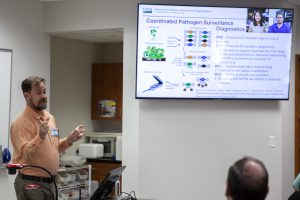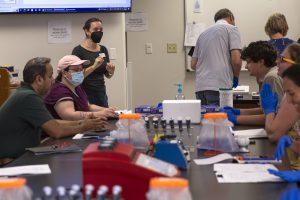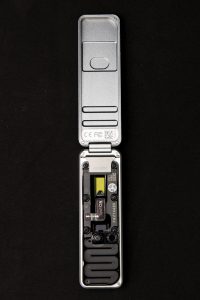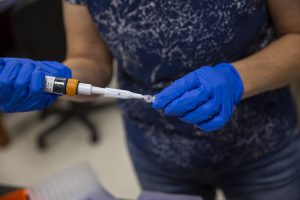Sixteen plant pathologists and diagnosticians from across the country – and as far away as Australia – gathered at the UF/IFAS Plant Diagnostic Center from March 7-9 to learn about a new process for identifying fungal plant pathogens.

The Universal Fungal Identification Tool (UFIT) Workshop, funded by an Agriculture and Food Research Initiative (AFRI) Grant awarded by the National Institute of Food and Agriculture (NIFA), allowed plant pathologists to sequence fungal pathogens with an emerging device in the world of molecular sequencing, the MinION sequencer from Oxford Nanopore Technologies (ONT). Participants learned how to use existing databases to classify the fungal pathogens taxonomically in the bioinformatics and data analysis portion of the workshop. Workshop attendees included diagnosticians from government agencies and from academia, including staff scientists, faculty members and graduate students.

The workshop was the outreach portion of the NIFA grant led by UF Plant Pathology Prof. Jeremy Brawner. Scientists from his lab developed a probe set to use with the MinION.The probe set was created as the very first way to capture genes specific and unique to fungi, making this the first universal fungal identification tool for an entire kingdom of organisms. The project was borne out of a desire to improve disease screening for breeding purposes, said Dr. Brawner, whose research focuses on disease-tolerant breeding programs. “Previous methods were frustrating, and at times inconclusive, delaying our ability to breed resistance.” Dr. Brawner’s lab is currently working on applying the technology to viruses. “We work on wheat viruses,” said workshop attendee Chandler Day, an associate diagnostician in the Kansas State University Department of Plant Pathology. “It would be great to do a single test instead of testing for each individual virus.”

The process learned at the workshop will help attendees identify unculturable and emerging pathogens. “This technology will be especially useful for diseases on plants that are hard to work with and pathogens that are impossible or difficult to culture,” said Dr. Carrie Lapaire Harmon, director of the UF/IFAS Plant Diagnostic Center and awardee of the grant. “Most of the diagnosticians who took part in the workshop did so because they are right now working on identifying cryptic fungal organisms on recalcitrant host material.”
Use of the MinION device allows greater sequencing capacity for plant pathogens. “The technology is more affordable on a lab basis compared to other technologies,” said workshop attendee John Bonkowski, Plant Disease Diagnostician at the Plant and Pest Diagnostic Laboratory at the Purdue University Department of Botany and Plant Pathology.
Creating a network of diagnosticians using the new technology was a goal of the workshop. “The whole idea was to get people here, show them it works so they can use it in their labs,” Dr. Brawner said, “which grows sets of data for the National Plant Diagnostic Network (NPDN),” a national network of 70 diagnostic labs in all 50 states and four territories. “Transferring technology like MinION sequencing and analysis from the research arena to the diagnostic lab will help keep NPDN diagnosticians at the leading edge of our applied science,” said Dr. Harmon, whose lab is part of the national network. “The benefit of transferring the technology via a hands-on group workshop is that each group becomes a cohort that can help each other and work together, generating more data for others to build on and ground-truthing sequencing projects with conventional diagnostics to benefit our grower clientele and natural ecosystem support.”
###
 2
2

